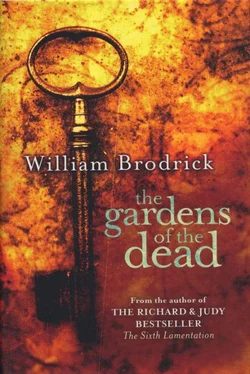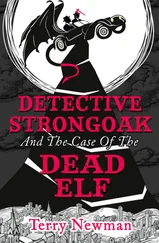William Brodrick - The Gardens of the Dead
Здесь есть возможность читать онлайн «William Brodrick - The Gardens of the Dead» весь текст электронной книги совершенно бесплатно (целиком полную версию без сокращений). В некоторых случаях можно слушать аудио, скачать через торрент в формате fb2 и присутствует краткое содержание. Жанр: Триллер, на английском языке. Описание произведения, (предисловие) а так же отзывы посетителей доступны на портале библиотеки ЛибКат.
- Название:The Gardens of the Dead
- Автор:
- Жанр:
- Год:неизвестен
- ISBN:нет данных
- Рейтинг книги:4 / 5. Голосов: 1
-
Избранное:Добавить в избранное
- Отзывы:
-
Ваша оценка:
- 80
- 1
- 2
- 3
- 4
- 5
The Gardens of the Dead: краткое содержание, описание и аннотация
Предлагаем к чтению аннотацию, описание, краткое содержание или предисловие (зависит от того, что написал сам автор книги «The Gardens of the Dead»). Если вы не нашли необходимую информацию о книге — напишите в комментариях, мы постараемся отыскать её.
The Gardens of the Dead — читать онлайн бесплатно полную книгу (весь текст) целиком
Ниже представлен текст книги, разбитый по страницам. Система сохранения места последней прочитанной страницы, позволяет с удобством читать онлайн бесплатно книгу «The Gardens of the Dead», без необходимости каждый раз заново искать на чём Вы остановились. Поставьте закладку, и сможете в любой момент перейти на страницу, на которой закончили чтение.
Интервал:
Закладка:
‘Even Louis Armstrong wouldn’t touch that number,’ observed Anselm, at the end of the song. It was hardly wise, but at least it wasn’t false.
George gave Anselm a friendly shove, as if they were pals sharing half a pint of mild. ‘These days,’ he said, ‘I’ve no choice about what I remember. Tomorrow, if we meet, don’t expect to pick up where you left off. Begin all over again. With me, I’m afraid, you’re always starting afresh… That’s not so bad, is it?’
Anselm raised his eyes, suddenly aware that a kind of pardon had been given to him. George’s thoughts seemed to mark his face like stippling on a reef, as though one might understand him by watching. There were no barriers left: the surface was the depth. Anselm was staring at George – right into him – and there was no anger, no resentment, no pride, just a certain shining quality, which might be the brightness of the light… and yet, which might not. Fumbling for confidence, he said, ‘Mr Bradshaw, about the trial, I asked you a very particular question.’
George raised a hand. ‘I’m no longer troubled by anything I can remember,’ he said simply ‘I’ve let it fall away… like a stone in the Thames.’ He patted Anselm’s arm, signalling the end of that particular conversation.
Anselm was disorientated, for this broken man spoke an idiom whose meaning he could barely follow (he’d had a similar problem with a traffic policeman in Czechoslovakia). On the one hand, the forgiveness had been given quickly and comprehensively; but on the other, it had come from a spirit of detachment that Anselm had never met before, save in some of the older monks at Larkwood. Anselm had no time to ponder either mystery because George had already moved on.
‘We went after Riley and I got hold of the works, like Elizabeth told me to.’
‘Yes.’
‘And she discovered what he was doing – it was there, in the numbers, plain to be seen. Once she’d cracked it she went to see him.’
‘Who?’
‘Riley.’
This was not something Anselm had anticipated. ‘What happened?’
‘She died,’ replied George. ‘I’m not saying he did anything, it’s just that death follows him around.’
Tentatively Anselm said, ‘Did she explain Riley’s scheme to you?’
‘Several times.’
‘Do you recall what she said?’
There was no doubt about it: George’s facial expressions revealed his thoughts. And at this moment it was evident that he considered Anselm to be rather slow ‘What do you think?’
‘No,’ replied Anselm apologetically.
‘Exactly’ George, however, was not especially troubled. ‘Elizabeth wrote it down. It’s in my jacket.’
Gently Anselm explained what had happened to George’s clothing, and, therefore, the letter, but the old fellow just made an ‘Ah’. That, it seemed, was just another stone in the river. Anselm was astonished. He said, as though to comfort himself, ‘But there’s still hope. Inspector Cartwright received all the business records through the post.’ He was struck by an idea. ‘Did you send them?’
‘I can’t remember.’
Anselm fetched up a grin. ‘Of course not. Sorry.’
‘I doubt if I posted anything, somehow’ George rubbed a finger into his brow, trying to knead a splintered thought to the surface. It wouldn’t come. He shrugged at the deep itch and said, ‘Can the Inspector understand them?’
‘No.’
‘Ah.’
‘But someone with an eye for these things will be considering them shortly’
‘Very good.’
‘You’ve done your part,’ said Anselm, wanting to give something back to this man who’d given so much. ‘Now you can rest.’
George raised his legs, looking down at the bandaged feet. ‘I lost my shoes, somehow, and I got terribly wet and cold.’ He became confused, his mind in suspension; he seemed to have heard a noise, like a scratching behind the wall. Quietly he said to himself, ‘No… no… It’s gone.’
Later in the day Anselm would ring Inspector Cartwright to recount the conversation that revealed how little George knew, and how much. But first, there was something else to be done. He reached deep into the oldest part of anyone’s memory, saying, ‘Would you like to go home, George?’
4
Nick Glendinning sat in the sitting room at St John’s Wood twirling a piece of paper between his fingers. Written on it was the telephone number of the woman who’d asked about ‘her lad’, the woman who’d probably received his mother’s last words. She hadn’t rung Charles, or the police or the medical services. She’d rung this stranger. What had she said, before dying?
At first, Nick told himself that Father Anselm was handling Elizabeth’s final dispensations – she’d planned it that way – so he tried to forget the question: he signed up as a locum, and he tried to assume a normal life – until it dawned on him that he’d stumbled on another secret, his mother’s last; and that whatever she’d said was more important than the key or anything retained in its box. This realisation haunted him. It made him pick up the telephone.
‘My name is Nicholas Glendinning,’ he said. ‘I understand you know my mother.’
He pressed the receiver against his ear, to stop his hand from shaking. All he could make out was laboured breathing.
‘Can I meet you?’ said Nick, pressing harder.
The air whistled in his ear. ‘Did she tell you about me?’
‘No.’
‘What do you want?’
‘To talk about my mother.’
The breathing grew calm. ‘I’d like that very much.’
Having noted the address, Nick rose and swivelled on his heels. Framed by the doorway was his father. His arms were almost raised. He looked like one of those entertainers in Covent Garden who don’t move until you give them some money.
They looked at each other, both utterly still. Abruptly Charles grimaced and flicked a finger in the air, as if he’d remembered what he was looking for. Then he quickly shuffled upstairs.
Nick sat on the sofa adjacent to a low table in the Shoreditch flat. The old woman was dressed in a yellow floral dress as if she were off to church or a summer garden party She wore earrings, a necklace and creaking leather shoes. The room was conspicuously tidy but very cold, even though a radiator clicked with activity. She’d had the windows open, and an air freshener had been used. Nick found the assembly of images and sensations unequivocally surreal. He could not imagine his mother traipsing up that filthy stairwell, or sitting here, before this apparition with silver hair and tragic eyes.
‘I don’t even know your name,’ he said awkwardly.
‘Mrs Dixon,’ she said, clearing her throat at the same time. ‘Refreshment?’
‘Yes, please.’
The low table was covered with a white cloth. It had been laid for a small reception. Mrs Dixon poured tea into ancient china cups. ‘Milk or lemon?’
‘Milk, thank you.
A whole ritual unfolded, as if he were a vicar, or the squire. She offered Nick sugar, a teaspoon from the Isle of Man and a jammy dodger from a cake stand.
‘Your mother was my friend,’ she said proudly ‘The Council sent her along when I got lonely’
‘The Council’ had evidently explained that she was dead. The flat vowel in ‘lonely’ disclosed that Mrs Dixon was not a Londoner. Her accent had been softened, but the northern intonation in that one word was unmistakable. Before Nick could think of what to say Mrs Dixon spoke again.
‘She came here every week, on a Friday and we talked… mainly about me, and my family’ Delicately Mrs Dixon raised her cup. ‘She was full of questions, but it did me good to get things off my chest. It’s not good to keep things in, that’s what I say.
Читать дальшеИнтервал:
Закладка:
Похожие книги на «The Gardens of the Dead»
Представляем Вашему вниманию похожие книги на «The Gardens of the Dead» списком для выбора. Мы отобрали схожую по названию и смыслу литературу в надежде предоставить читателям больше вариантов отыскать новые, интересные, ещё непрочитанные произведения.
Обсуждение, отзывы о книге «The Gardens of the Dead» и просто собственные мнения читателей. Оставьте ваши комментарии, напишите, что Вы думаете о произведении, его смысле или главных героях. Укажите что конкретно понравилось, а что нет, и почему Вы так считаете.












